If Water Was Non-Polar, Would We Still Have Oceans?
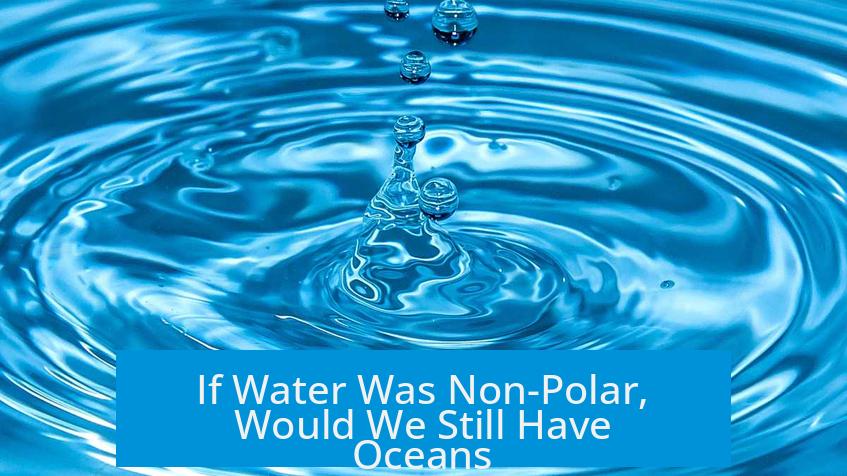
The immediate answer is no; if water lost its polarity and became non-polar, large liquid oceans as seen on Earth would not exist. Water’s polarity drives its unique intermolecular forces and physical properties that sustain oceans. Removing or altering this polarity changes its phase behavior, density, and environmental role, leading to a dramatically different scenario for bodies of liquid on Earth.
How Water’s Polarity Creates Oceans

Water molecules possess polarity because oxygen is more electronegative than hydrogen. This polarity induces hydrogen bonding, a strong intermolecular force responsible for water’s high boiling and melting points relative to its molecular size. These hydrogen bonds make water a liquid at standard temperature and pressure (STP), unlike similar-sized non-polar molecules such as methane, which are gases under the same conditions.
- Hydrogen bonding raises water’s boiling point from what would be near methane’s (−161.5°C) to 100°C.
- Water’s polarity causes it to be dense in liquid form, allowing it to remain liquid over broad temperature ranges.
Without polarity, water molecules would lack these strong intermolecular attractions, causing the substance to exist mostly as a gas at Earth’s temperature and pressure. This fundamentally eliminates stable, vast bodies of liquid water, hence no oceans.
Effects of Turning Off Polarity

If oxygen and hydrogen had equal electronegativities, water would be non-polar and hydrogen bonding would vanish. Simulations and theoretical models suggest several outcomes:
- No stable hydrogen bonds: The network of interactions that keep water liquid at moderate temperatures disappears.
- Lower boiling point: Water would boil and evaporate at much lower temperatures, similar to methane’s low boiling point.
- Phase shift to gas: At Earth-like conditions, water would be a gas, preventing ocean formation.
Therefore, if turning off polarity simply replaces oxygen’s electronegativity with that of hydrogen, water would fail to form oceans.
What if Water Became Linear and Non-Polar?
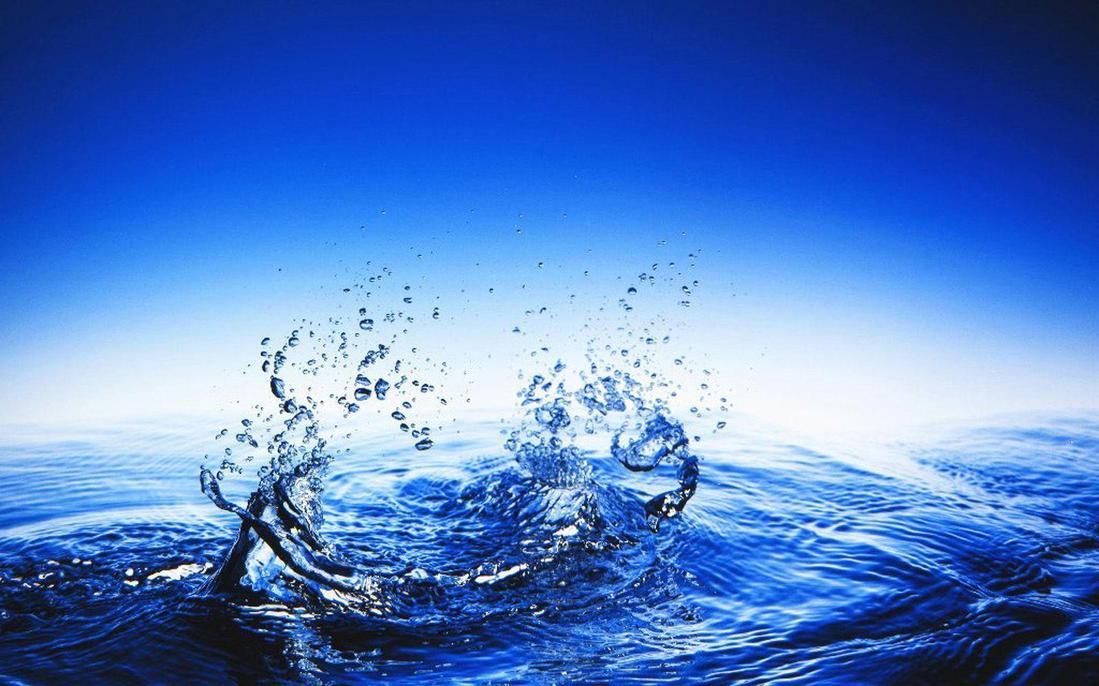
Water’s natural bent geometry makes it polar. If water were forced to adopt a linear shape, it would become non-polar too. However, in a hypothetical scenario where water molecules are linear, some hydrogen bonding might still remain because of temporary molecular motions. This possibility is less well understood but could imply:
- Retention of a liquid phase at lower temperatures.
- A reduction in boiling point from the current 100°C to a significantly lower temperature.
- Less stable oceans, if any, due to weaker intermolecular forces.
Yet, this scenario remains speculative and uncertain. The dominant view is that losing polarity drastically reduces water’s ability to stay liquid on Earth’s surface.
Comparison With Similar-Sized Non-Polar Molecules
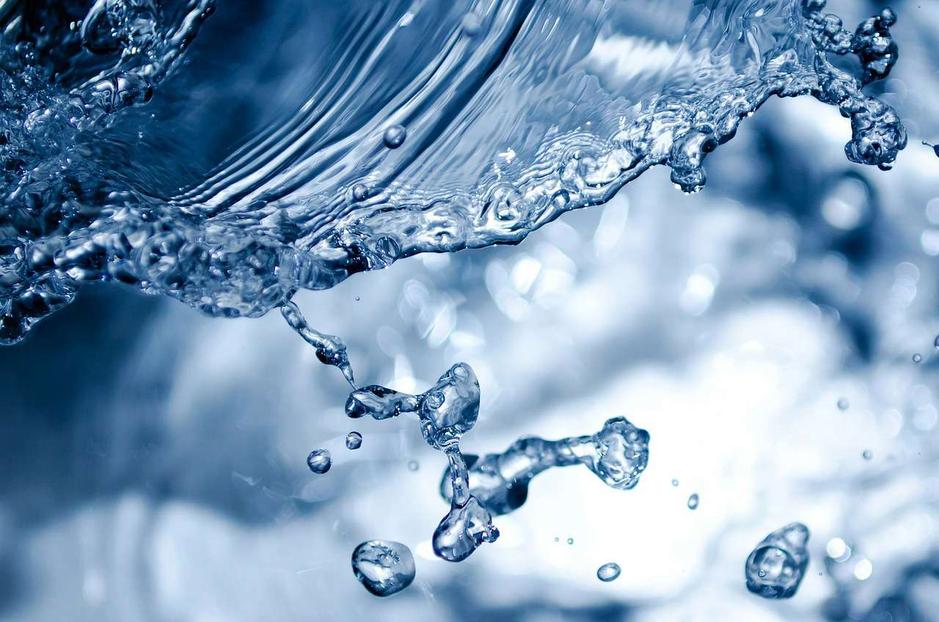
Methane (CH4) provides a useful contrast to water (H2O). Methane is non-polar, of similar molecular size (16.05 g/mol vs. 18.02 g/mol), but is a gas at STP. Water’s polarity leads to much higher cohesion and a liquid state.
| Molecule | Polarity | Boiling Point (°C) | State at STP |
|---|---|---|---|
| Water (H2O) | Polar | 100 | Liquid |
| Methane (CH4) | Non-polar | -161.5 | Gas |
If water were to lose polarity or if oxygen’s electronegativity dropped towards carbon’s value, water would behave like methane, becoming a gas under Earth conditions. This transformation would prevent oceans from forming.
Could Non-Polar Liquids Form Oceans Like Systems?

Non-polar liquids can form large liquid bodies under appropriate temperature and pressure. Titan, Saturn’s moon, has large methane lakes and seas due to its colder environment and atmospheric composition. Titan’s example shows non-polar liquid oceans can exist, but only in conditions vastly different from Earth’s.
This supports the conclusion: non-polar liquids can form large bodies, but Earth’s surface conditions rely heavily on water’s polarity to sustain liquid oceans.
Density, Hydrogen Bonding, and Ocean Stability

Water’s polarity also causes unique density behaviors, important for ocean dynamics:
- Ice is less dense than liquid water: Ice forms a lattice with hydrogen bonds that create more spacing.
- Oceans freeze from the top down: This protects aquatic life by providing insulation.
- Without polarity: Ice would be denser, oceans might freeze from bottom up, threatening marine ecosystems.
Polarity affects ocean lifecycle and seasonal behavior intimately, further reinforcing the necessity for polarity in sustaining Earth’s oceans.
Atmospheric Retention and Water’s Phase
Polarity affects how water interacts with the atmosphere. Air can retain only limited water vapor. Excess water condenses into liquid, forming oceans and other surface water.
If water were non-polar and gaseous at Earth temperature:
- Much of it would escape Earth’s gravity over geological timescales.
- Without liquid water to form oceans, Earth’s climate and biosphere would drastically change.
- Non-polar, gaseous water analogs would behave more like hydrogen sulfide (H2S), which is volatile and not retained significantly on Earth.
Summary of Key Points
- Water’s polarity enables strong hydrogen bonding, crucial for liquid oceans at Earth conditions.
- Removing polarity reduces intermolecular forces, lowers boiling points, and converts water into a gas.
- Non-polar liquids like methane can form large bodies only under very cold conditions unlike Earth’s.
- Polarity affects ice density, enabling oceans to freeze top-down, protecting aquatic life.
- Loss of polarity would result in no stable liquid oceans, fundamentally altering Earth’s environment.
If Water Was Non-Polar, Would We Still Have Oceans?
Short answer: No, we wouldn’t have oceans like the ones we know. Instead, water would mostly float away as gas, and liquid oceans probably couldn’t exist on Earth’s surface.
Let’s dive into why water’s polarity matters so much—and what happens if you flip that property off. Imagine a world where water molecules aren’t polar. Would oceans still dance on our blue planet? Curious? Let’s unpack this puzzle.
What Is Water Polarity and Why Does It Matter?
Water molecules are made of two hydrogen atoms bonded to one oxygen atom. Oxygen has a stronger pull on electrons—called electronegativity—than hydrogen. This imbalance creates a polarity, meaning one side of the molecule slightly attracts electrons, while the other pushes them away.
This polarity is key. It causes water molecules to stick together through hydrogen bonds—a special kind of attraction—that’s stronger than typical forces in non-polar molecules. This stickiness is why water clumps, flows, freezes, and boils the way it does.
What If Water Lost Its Polarity?
Imagine scientists could dial down or even switch off water’s polarity by making oxygen’s electronegativity equal to hydrogen’s. Basically, the electrical tug-of-war disappears. What happens next?
As user /uMatth_3w explains, this “polarity off” water would lose its strong hydrogen bonding. With no molecular glue, water molecules wouldn’t hold together in liquid form at Earth’s temperatures. The oceans, as they currently exist, likely vanish. Instead, water would behave more like a gas.
This happens because without polarity, water molecules weakly interact, just like methane (CH4), a similar-sized molecule that’s non-polar and exists as a gas at room temperature and pressure.
Methane vs Water: The Tale of Two Molecules
Methane and water have similar weights—16.05g/mol vs 18.02g/mol, respectively. But methane is a gas at standard temperature and pressure (STP), and water is liquid. What makes the difference? Hydrogen bonds fueled by polarity.
If water’s oxygen lost its electronegativity, making it less polar or even non-polar, water would start acting like methane. It would likely exist mostly as a gas. Thus, oceans as liquid seas wouldn’t hang around.
Could Water Adopt Another Geometry and Save the Oceans?
Water molecules normally have a bent shape, which supports their polarity. Hypothetically, maybe water became linear and thus non-polar. Could oceans cling on then?
This scenario is trickier. Linear water molecules might still form some hydrogen bonds, even if weaker. This could retain a liquid phase, but at a lower boiling point. So, oceans might be smaller, less stable, or rarer.
Still, this is more theoretical gymnastics than reality. The dominant takeaway: water’s usual polarity is fundamental for our oceans.
Non-Polar Liquids and Large Bodies: Aren’t There Examples?
Well yes. Titan, Saturn’s largest moon, boasts large methane lakes. Methane’s non-polar but liquid at frigid Titan temperatures. That shows non-polar liquids *can* form lakes or seas, but they need the right conditions—mainly very cold temperatures.
On Earth, with its temperature and atmosphere, methane is a gas, and non-polar water would be too.
Why Does Water Polarity Help Keep Oceans?
Water’s polarity means molecules stick together well, giving water a high boiling point. Earth’s air can only hold so much water vapor (think of it like a sponge). When the air saturates, excess water falls to the surface as liquid, making oceans and rain.
Water’s density also helps. It’s lighter than rock and heavier than air, so it pools on Earth’s surface instead of floating away. Remove polarity, lose hydrogen bonding, and water’s boiling point drops dramatically. Much more water evaporates and escapes into the atmosphere—or even into space.
What Happens to Non-Polar “Water” on Earth?
If we had non-polar water on Earth, most of it would be a gas. Some might escape Earth’s gravity, like hydrogen sulfide (H2S)—which is heavier and less polar than water but remains gaseous.
Without oceans, life would face huge challenges. Oceans moderate climate, support marine ecosystems, and drive the water cycle. No liquid oceans, no rains, no rivers. The planet would be starkly different.
A Word on Ice: Why Does Water Freeze from the Top?
Water’s hydrogen bonds create an unusual ice structure—a matrix with a strict tetrahedral pattern. This makes ice less dense than liquid water, so ice floats.
This floating ice insulates liquid water beneath and allows life to survive freezing winters. Non-polar water wouldn’t have this property. Ice, if formed, would sink, possibly freezing oceans from the bottom up and threatening aquatic life.
Could a Denser Atmosphere Save Oceans in This Hypothetical?
If Earth’s atmosphere were denser, it could hold more water vapor. Maybe water vapor wouldn’t fall out as liquid all the time. Instead, we might have vast moist air masses covering land and oceans.
However, without polarity, water molecules won’t stick together strongly enough to condense into liquid easily. So denser air alone can’t create oceans without water’s polar nature.
In Conclusion: Why Water’s Polarity Is Non-Negotiable
Water’s polarity is the unseen hero of our oceans. It enables hydrogen bonding, which holds liquid water together at Earth-like temperatures and pressures. Without it, water would be mostly gas, and oceans as we know them wouldn’t exist.
The comparison to methane emphasizes that size and weight aren’t enough to guarantee liquid oceans; molecular polarity is key.
Even considering linear geometry or hypothetical atmospheric changes, the fundamental chemistry tells us oceans rely on polarity to persist.
So next time you splash your ocean water, remember: it’s not just H2O, it’s polar H2O. That tiny electromagnetic imbalance is what holds together the watery world.
**Got any other “what if” questions about Earth’s chemistry? Drop them below!**
Would oceans exist if water molecules were non-polar?
No, large bodies like oceans would likely not form. Non-polar water molecules would have weaker intermolecular forces, causing water to stay mostly in gas form under Earth-like conditions.
How does water’s polarity affect its physical state compared to similar molecules?
Water’s polarity creates hydrogen bonds, making it liquid at room temperature. Methane, a similar-sized non-polar molecule, is a gas because it lacks hydrogen bonding and has weaker forces between molecules.
Could non-polar liquids form large bodies like oceans on other planets?
Yes, non-polar liquids can form large bodies. For example, Titan has methane lakes, showing non-polar liquids can pool under certain environmental conditions, though they differ greatly from Earth’s oceans.
What role does hydrogen bonding play in ocean behavior and freezing?
Hydrogen bonding causes ice to be less dense than liquid water, so oceans freeze from the top down. Without polarity, water would freeze from the bottom up, which could prevent life in deep oceans.
Why does water remain on Earth’s surface rather than in the atmosphere?
Water’s density and polarity limit how much vapor air can hold. Excess water condenses and falls as liquid, forming oceans. Non-polar water would not condense similarly, likely remaining gaseous or escaping.


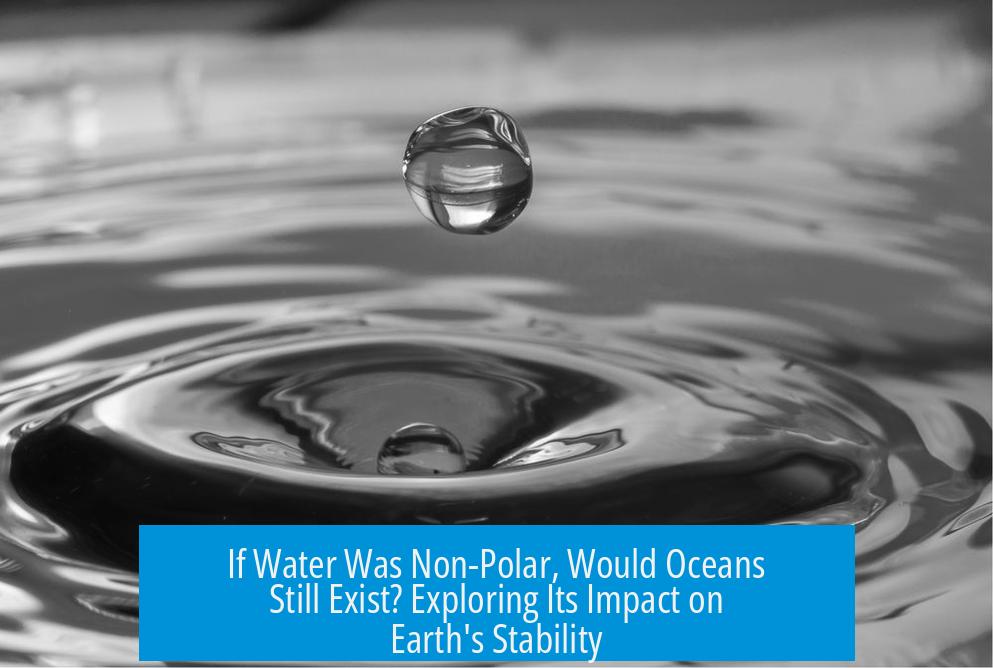
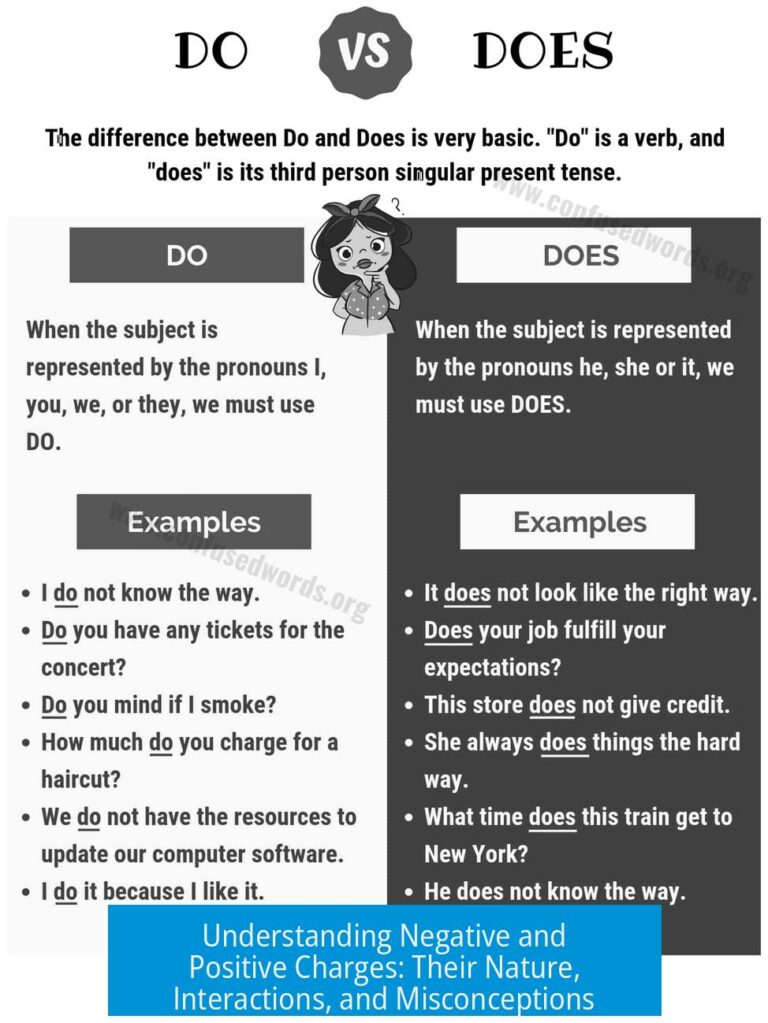

Leave a Comment